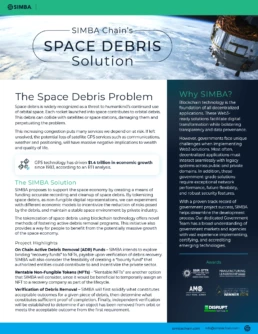The Space Debris Problem
Established in 2019, the United States Space Force (USSF) is a distinct branch of the armed services, organized under the Department of the Air Force. The USSF is responsible for organizing, training, and equipping service members to conduct space operations.
Challenge
Space debris is widely recognized as a threat to humankind’s continued use of orbital space. Each rocket launched into space contributes to orbital debris. This debris can collide with satellites or space stations, damaging them and perpetuating the problem.
This increasing congestion puts many services we depend on at risk. If left unsolved, the potential loss of satellite GPS services such as communications, weather and positioning, will have massive negative implications to wealth and quality of life.
Challenge
Space debris is widely recognized as a threat to humankind’s continued use of orbital space. Each rocket launched into space contributes to orbital debris. This debris can collide with satellites or space stations, damaging them and perpetuating the problem.
This increasing congestion puts many services we depend on at risk. If left unsolved, the potential loss of satellite GPS services such as communications, weather and positioning, will have massive negative implications to wealth and quality of life.
GPS technology has driven $1.4 trillion in economic growth since 1983, according to an RTI analysis.
Solution
SIMBA proposes to support the space economy by creating a means of funding accurate recording and cleanup of space debris. By tokenizing space debris, as non-fungible digital representations, we can experiment with different economic models to incentivize the reduction of risks posed by the debris, and maintain a stable space environment by private industry.
The tokenization of space debris using blockchain technology offers novel methods of fostering active debris removal programs. This initiative also provides a way for people to benefit from the potentially massive growth of the space economy.
Project Highlights
On Chain Active Debris Removal (ADR) Funds – SIMBA intends to explore binding “recovery funds” to NFTs, payable upon verification of debris recovery. SIMBA will also consider the feasibility of creating a “bounty fund” that authorized entities could contribute to and incentivize the private sector.
Rentable Non-Fungible Tokens (NFTs) – “Rentable NFTs” are another option that SIMBA will consider, since it would be beneficial to temporarily assign an NFT to a recovery company as part of the lifecycle.
Verification of Debris Removal – SIMBA will first solidify what constitutes acceptable outcomes for a given piece of debris, then determine what constitutes sufficient proof of completion. Finally, independent verification will be established to determine if an object has been removed from orbit or meets the acceptable outcome from the first requirement.
Solution
SIMBA proposes to support the space economy by creating a means of funding accurate recording and cleanup of space debris. By tokenizing space debris, as non-fungible digital representations, we can experiment with different economic models to incentivize the reduction of risks posed by the debris, and maintain a stable space environment by private industry.
The tokenization of space debris using blockchain technology offers novel methods of fostering active debris removal programs. This initiative also provides a way for people to benefit from the potentially massive growth of the space economy.
Project Highlights
On Chain Active Debris Removal (ADR) Funds – SIMBA intends to explore binding “recovery funds” to NFTs, payable upon verification of debris recovery. SIMBA will also consider the feasibility of creating a “bounty fund” that authorized entities could contribute to and incentivize the private sector.
Rentable Non-Fungible Tokens (NFTs) – “Rentable NFTs” are another option that SIMBA will consider, since it would be beneficial to temporarily assign an NFT to a recovery company as part of the lifecycle.
Verification of Debris Removal – SIMBA will first solidify what constitutes acceptable outcomes for a given piece of debris, then determine what constitutes sufficient proof of completion. Finally, independent verification will be established to determine if an object has been removed from orbit or meets the acceptable outcome from the first requirement.
Why SIMBA?
Blockchain technology is the foundation of all decentralized applications. These Web3-ready solutions facilitate digital transformation while bolstering transparency and data provenance.
However, governments face unique challenges when implementing Web3 solutions. Most often, decentralized applications must interact seamlessly with legacy systems across public and private domains. In addition, these government-grade solutions require exceptional network performance, future flexibility,
and robust security features.
With a proven track record of government project success, SIMBA helps streamline the development process. Our dedicated Government Team has a broad understanding of government markets and agencies with vast experience implementing, certifying, and accrediting emerging technologies.
